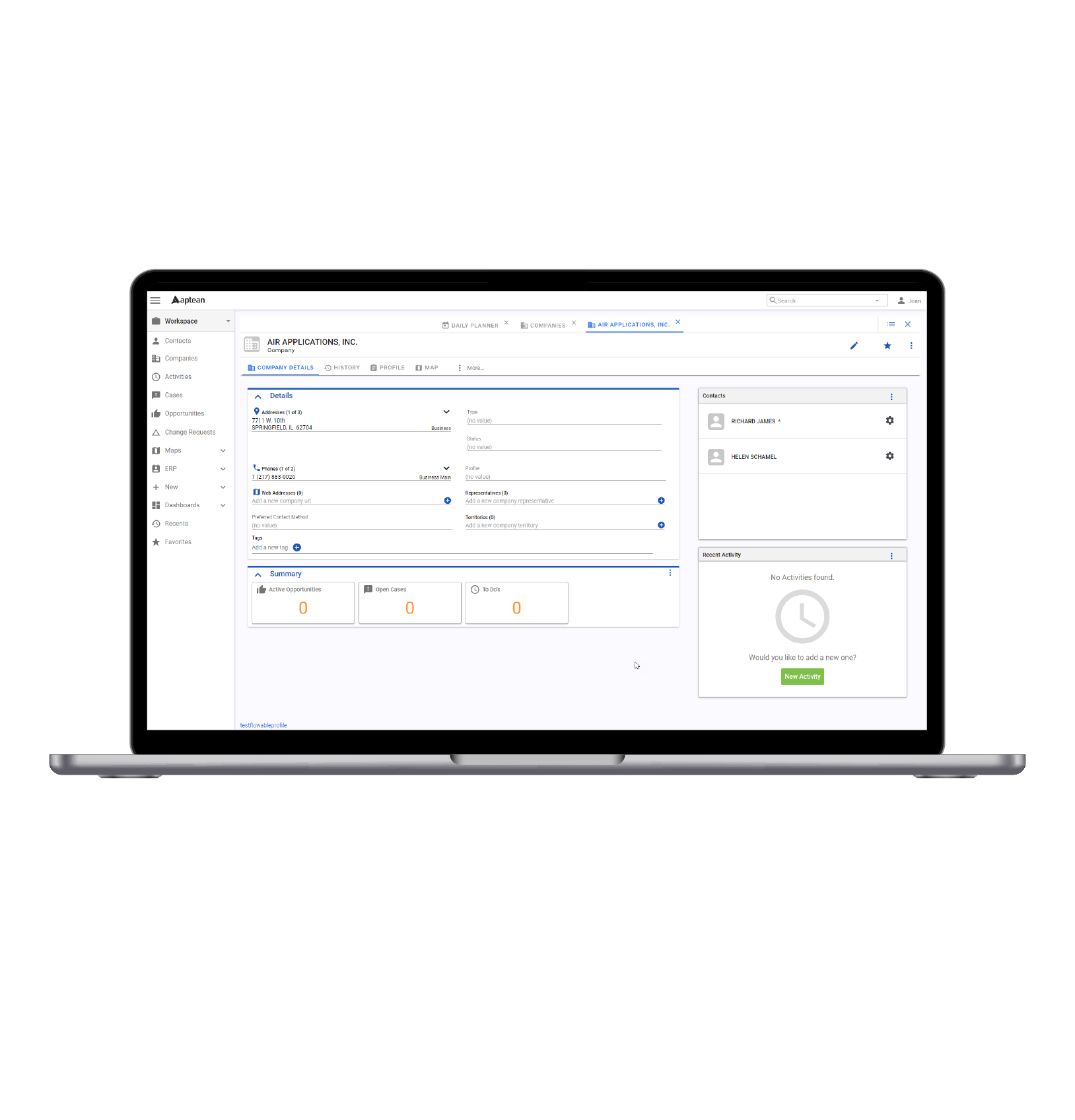Enlaces rápidos
4 Questions To Ask When Buying ERP Software
4 Questions To Ask When Buying ERP Software
Mar 14, 2022
 Aptean Staff Writer
Aptean Staff Writer 
There’s no doubt that an enterprise resource planning (ERP) solution can transform your business. From improved efficiency and increased visibility to watertight regulatory compliance and reduced costs—the benefits of ERP truly do speak for themselves. And, in a world that continues to race towards widespread automation, digital sophistication and technological advancement, an ERP is a vital foundation for your digital transformation.
Simply put, without a powerful ERP in your corner, your competition is going to leave you in the dust sooner rather than later.
But, when choosing such a crucial piece of software, the stakes are undoubtedly high. An ERP system will touch every department in your organization, house a wealth of your business-critical data and be used by your staff day in, day out. Add to that the time, effort and expense required to implement an ERP solution and one fact becomes very clear: making a mistake could prove very costly to your business.
So, how do you go about ensuring you choose the right ERP system?
Luckily, the answer is simple—good preparation. Whether it’s your first ERP implementation or you’re replacing a legacy system, conducting thorough research on both the solutions and vendors that you’re considering is crucial. To help you in this evaluation process, here are the four key questions to ask your shortlisted ERP vendors to set your business up for success.
1. Is the System Set Up To Support Your Industry?
The first step when embarking on any software purchasing journey is to identify which business objectives and expected benefits are your priorities. Armed with this list of key objectives, you can establish what functionality you will need in order to achieve those goals, quickly discarding solutions that don’t fit the bill and creating a shortlist to investigate further.
Additionally, it’s important to understand that while a generic ERP platform may fulfill the majority of a business’s aims, most organizations will need an industry-specific ERP solution that includes the specialized functionalities really necessary to drive lasting success.
Whether you’re a manufacturer, distributor or food and beverage organization, choosing an ERP vendor that specializes in your industry gives you two main advantages.
Firstly, the software will already have tried-and-tested features built in that were designed for the nuances of your industry. Secondly, the vendor will have a good understanding of your industry challenges, regulations, trends and best practices, so they can help you gain the maximum benefit from your ERP system.
Once you’ve defined your list of must-have industry-specific functionality, it’s important to check that your potential vendors can truly walk the walk. This means ensuring you see a live product demonstration and establish the vendors experience in your industry.
In the demo, you’re looking to find out:
Does the system truly have the industry-specific features it’s billed to, or are workarounds required?
Do those features come as standard or are there additional modules that you’ll need to purchase?
Is the functionality easy to access and use for your staff?
When evaluating vendor experience you need to know:
How long have they been providing software to your industry?
Can they offer testimonials and case studies for similar sized companies in your vertical sector?
Do they have references that you can speak to for further information?
To help construct your list of required functionality, check out these resources: 5 Must-Have Features in an ERP for the Apparel Industry, Best ERP for Manufacturing: A Features Checklist, Distribution ERP Software: 6 Must-Have Features and Must-Have Features in a Food Industry ERP.
2. Is the ERP System Future-Proof?
Let’s be honest, it’s unlikely that you’ll be able to answer this question quickly, or with a simple “yes” or “no.” There are multiple factors you’ll need to consider, but your industry never stands still, and as such your business and processes will also change over time. You need to be sure that the software you choose now will still be able to fuel your growth months and years down the line, so taking the time to evaluate the potential long-term value of your shortlisted solutions is vital.
Here are three key factors you’ll need to think about:
Deployment options: When it comes to deployment, your main choice will be whether you choose an on-premise or cloud-based implementation. You’ll need to assess which option best suits your business, but generally speaking, cloud implementations tend to offer long-term benefits such as empowering remote working, increasing security, supporting scalability and improving reliability. So be sure to grant preference to vendors that offer proven cloud-based solutions that can support your business as it grows.
Integration with other systems: Not only does your ERP software need to integrate with your existing business systems, but to truly evaluate whether a solution will be future-proof or not, you’ll need to consider the technologies you hope to use down the line. For example, if ERP is the first step in your digital transformation, and you intend to implement business intelligence (BI) software or an eCommerce platform next, be sure to ask your vendor about those integrations.
Development pipeline: Any future-proof software must move with the times. Whether it’s responding to advances in technology, industry trends or regulatory changes, the functionality you’re able to access must reflect today’s world, not yesterday’s. Choosing a vendor with an innovative and forward-thinking ethos is paramount here, so you can be confident that your chosen solution remains cutting-edge. An easy way to check this is to ask your shortlisted vendors about the product development pipeline and any upcoming features.
Ultimately, if your ERP system does not adjust with your changing business processes or industry requirements, then its usefulness and lifespan is severely limited—impacting both your ROI and your competitive advantage.
3. What Does the Implementation Process Entail?
It may seem like you’re getting ahead of yourself to ask about implementation during the shortlisting phase, but in truth, the implementation process can make or break the success of your ERP project.
Without the necessary preparation and clarity from both sides of the table, ERP implementations can quickly become complex—burning unnecessary time, money and effort. Not only does this hit your bottom line and ultimate ROI, but it can also damage the perception of the project as a whole, negatively affecting staff adoption and limiting the realization of key benefits.
So, what should you be looking for? First and foremost, you’ll want to choose an experienced vendor. If they’ve implemented their software at hundreds of other companies, they’ll be able to offer trusted guidance along the way to ensure everything goes as smoothly as possible. In addition, they should be able to provide you with a typical roadmap that includes key milestones, requirements and deliverables, giving you the confidence that every step will be accounted for at the right time.
And finally, you’ll want to find out who will be involved. ERP implementations can be long and complicated, so having dedicated contacts that you know and trust is crucial to effective change management. Knowing that there’s an expert in your corner with experience of the common pitfalls or nuances of this kind of project will set your team members’ minds at ease and ensure they have all the help they need to make the implementation a success.
For a detailed look at what makes a successful ERP implementation, check out our full guide: 10 Steps to Successful ERP Implementation.
4. What Happens After Installation?
Developing and installing the software is just the first step. Your vendor should be a partner that will work by your side to ensure you’re getting the most from your ERP software, even as your business changes and grows.
It’s therefore important to establish early in the evaluation process what training, support and involvement each provider can offer after you’ve signed on the dotted line. Some questions to ask:
What initial training options do you offer for our staff?
Can we access additional training in the future if team members change or we utilize new features?
What level of technical support can we expect from you?
How are software upgrades handled?
Can we continue to access advice and support as our business needs change?
Can we expand our ERP platform in the future with other modules and solutions from you?
Your ERP software should be the beating heart of your operation, so it—and the team that uses it every day—will require ongoing support. Thus, it’s important to choose a vendor that can confidently deliver that steadfast assistance. After all, you’re not just buying a piece of software, you’re investing in your organization’s future—you need a partner that is there for every step of that journey.
Taking Your Next Step With Aptean
There’s no two ways about it, choosing the right ERP software for your business is a daunting and complex task. But, with careful preparation and a methodical approach, you can identify not only a solution, but a vendor that will meet your requirements now and into the future.
Here at Aptean, we’re passionate about not settling for “good enough.” We combine deep industry knowledge and technical expertise to bring you sophisticated industry-specific solutions that are proven to conquer your challenges and supercharge your success.
Not only do our solutions stand out from the crowd, but our experienced in-house teams are on hand every step of the way to offer the help and guidance you need. So, no matter which stage of the process you’re at, you can rest assured that we’ve got you covered.
Ready to take your next step with Aptean by your side? Get in touch with our ERP experts today or take a look at our range of industry-specific ERP solutions.
¿Todo listo para transformar tu negocio?
Tenemos las soluciones ERP especializadas que necesitas para superar los desafíos de tu sector.



